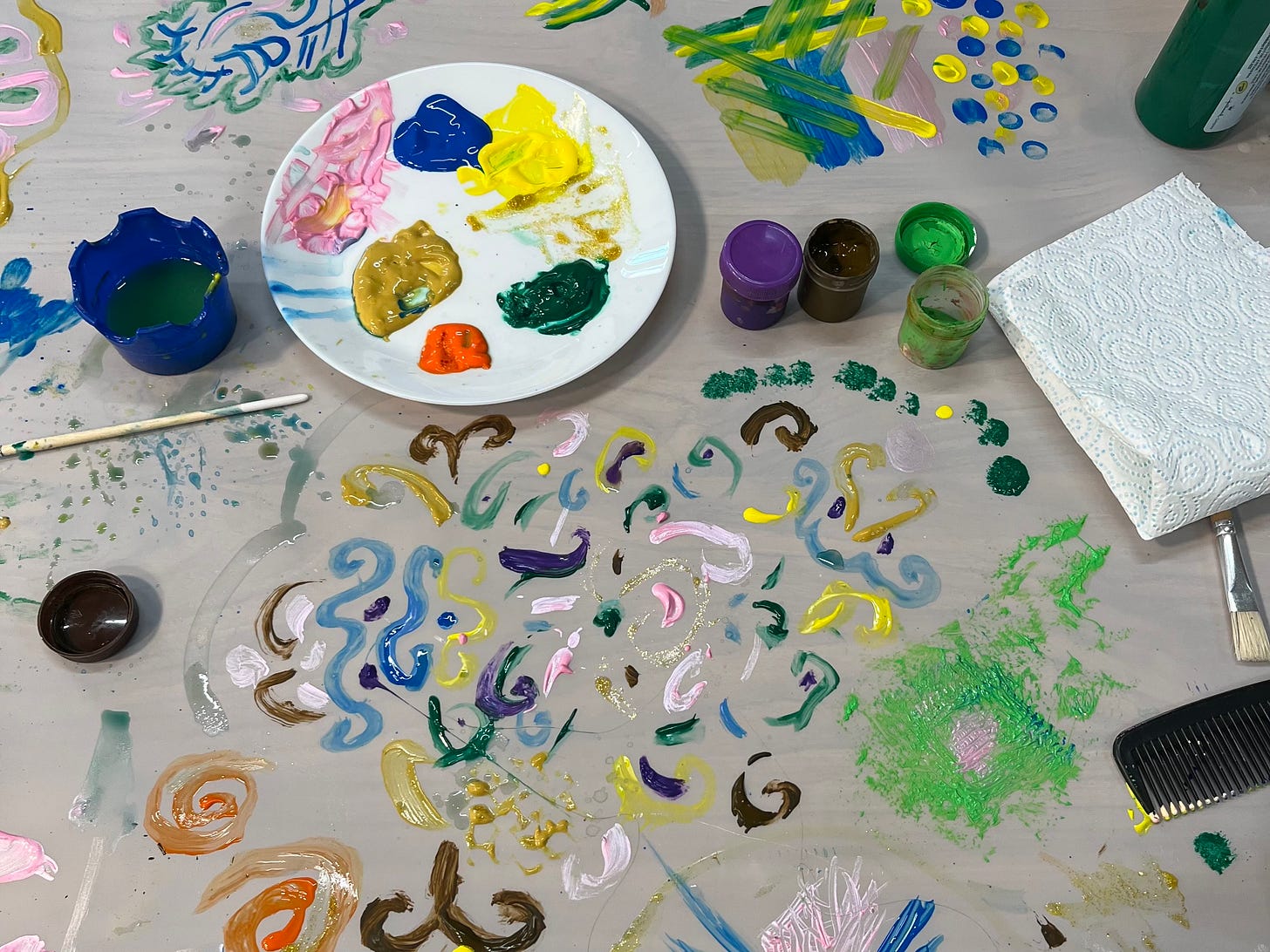Remaining Human in the Age of AI
A manifesto for human agency, creativity, critical thought and learning in the time of generative AI
Do you know that mental itch that comes with standing in a queue – that impulse to reach for your smartphone and start scrolling some feed?
The pull to fill every quiet moment with some distraction, something to fill your attention from elsewhere, blocking your attention to the here and now.
If you’re anything like me, you wrestle with it daily. For all the benefits that smartphones bring, they come at a constant background cost to our attention.
But recently I’ve started developing another itch, one that’s even more insidious. I’ve been experimenting with generative AI a lot over the last couple of years (since even before ChatGPT launched). It’s often a very useful tool, if you’re mindful of its limitations and likelihood of hallucinating. I’ve tried to use it experimentally and mindfully, working to discern how it can aid my thought rather than be a substitute for it. I’ve focused on find situations where it can help me refine and adapt what I’ve already been working on, or help as a better search engine en route to reading reliable sources that I can read and analyse for myself.
And yet… lately, whenever I’ve had a tricky question to address or piece of writing or communication to do, I’ve had a new itch.
I’ve caught myself thinking “I should pop that into ChatGPT (or Gemini or Claude or…)” Before I’ve even taken the time to think through a task or question myself, the temptation is there to get a quick and easy response.
Even as a critical, cautious user, I’m finding myself being habituated to referring to AI as a daily convenience.
I don’t think that’s healthy, and I want to take a step back.
The downsides of AI
What’s more, the emerging picture of the impact of AI on education and literacy is truly terrifying. Here are a couple of eye-catching articles highlighting some of the issues AI has unleashed:
People Are Losing Loved Ones to AI-Fueled Spiritual Fantasies - Rolling Stone
This tells the heartbreaking story of Kat, who separated from her husband due to AI.
It started with him using AI to compose texts to her and analyse their relationship, and sent him spiralling down a dark rabbit hole of conspiracy theories and messianic delusion:
Kat was both “horrified” and “relieved” to learn that she is not alone in this predicament, as confirmed by a Reddit thread on r/ChatGPT that made waves across the internet this week. Titled “Chatgpt induced psychosis,” the original post came from a 27-year-old teacher who explained that her partner was convinced that the popular OpenAI model “gives him the answers to the universe.” Having read his chat logs, she only found that the AI was “talking to him as if he is the next messiah.” The replies to her story were full of similar anecdotes about loved ones suddenly falling down rabbit holes of spiritual mania, supernatural delusion, and arcane prophecy — all of it fueled by AI. Some came to believe they had been chosen for a sacred mission of revelation, others that they had conjured true sentience from the software.
Everyone Is Cheating Their Way Through College - NYMag.com
It’s no surprise that AI is disrupting education. What’s depressing is how it extends the structural problems that prioritise grades over actually learning to think to their logical endpoint.
Even students who like writing feel the pressure to use ChatGPT to get better grades:
Once the chatbot had outlined Wendy’s essay, providing her with a list of topic sentences and bullet points of ideas, all she had to do was fill it in. Wendy delivered a tidy five-page paper at an acceptably tardy 10:17 a.m. When I asked her how she did on the assignment, she said she got a good grade. “I really like writing,” she said, sounding strangely nostalgic for her high-school English class — the last time she wrote an essay unassisted. “Honestly,” she continued, “I think there is beauty in trying to plan your essay. You learn a lot. You have to think, Oh, what can I write in this paragraph? Or What should my thesis be? ” But she’d rather get good grades. “An essay with ChatGPT, it’s like it just gives you straight up what you have to follow. You just don’t really have to think that much.”
It’s one thing to use generative AI as a helper when you’ve already learned to think and to create, though even that carries risks of atrophying vital skills. It’s another for a whole generation to grow up never having the chance to develop the literacy and critical thinking skills in the first place.
This is true not just of literacy and critical thinking, but of creativity. I recently wrote about how the creative process works:
Creativity and spiritual inspiration: Iain McGilchrist and C.S. Lewis on Reason and Imagination
How does creativity work? What’s going on in our brains when we exercise our imaginations? What’s the relationship between the creative imagination and our more deliberative reason?
Creativity takes time and attentiveness to the real world. It’s a messy, inefficient, beautifully human quest for insight and beauty. If we rely on AI, we undermine something rich and vital about what it means to be human.
Not Luddism
Let me be clear: I think AI has a lot of potential for good. This isn’t about knee-jerk Luddism or a new moral panic.
But we don’t have to treat unrestricted use of generative AI as inevitable: we can shape the future we want through setting cultural norms, agreed standards or indeed legislation and regulation.
We should learn from the mistakes of our rapid embrace of smartphones and social media, which came with lots of social costs, and take a more critical approach to these new technologies.
Remaining human
So how can we remain human in the age of AI?
I’m working on a manifesto for human agency, creativity, critical thought and learning. It’s an early outline and light on practical details as yet, but I want to get it out for feedback and starting point for discussion:
A manifesto for human thought and creativity
Human creativity, thought and learning are inherently valuable and worth protecting:
Communication is to be valued as a way for humans to connect to one another, sharing stories, experiences, ideas and feelings.
Learning is not just about results or marks, but about embracing the process and how it shapes our intellectual and moral capabilities.
Art is to be valued as a relationship, not a commodity or mere ‘content’. Art involves human persons engaging with the real in transformative ways with intentionality as a form of creative expression.
Unconstrained and uncritical use of generative AI poses a threat to our humanity:
To the extend that generative AI replaces or reduces human agency, thought and creativity, it is dehumanising and diminishes the value of its output, regardless of the perceived quality of its output.
Generative AI may have beneficial uses to aid human thought rather than as a substitute for it. However, the use of generative AI contains the essential temptation to use it as a shortcut or replacement for human thought and creativity. It risks increasing dependency and reduced human agency.
The diminishment of learning, creativity and communication is not solely down to AI. These have been under pressure due to pre-existing unhealthy social, cultural and technological trends. However, AI acts as an accelerator and risks delivering a death-blow to education, critical thought and literacy that could be catastrophic to our culture.
AI skepticism is necessary and collective action is needed:
The unconstrained use of generative AI is a choice not a necessity, both individually and as a society.
A posture of technological skepticism towards the claims, hype and agendas of companies and personalities pushing AI is rational and appropriate.
We must all take personal responsibility for our own use of generative AI, either avoiding it completely or using it in a limited, supporting role, to protect our own cognitive abilities.
Personal responsibility is not sufficient to meet the challenge of our times: it becomes highly costly to take a stand against it individually when ‘everyone is doing it’. We need to rapidly develop new social norms and regulation of AI to minimise its harms, and to go slow in evaluating its wider impacts, in addition to considering legitimate benefits it may bring.
Particular care should be taken to understand the risks of generative AI to the development of children and young people.
AI-skepticism needs a much stronger voice in the public debate in the media, in politics and in wider culture.
Let me know what you agree and disagree with, what actions you think we should be driving for collectively, and how we might build momentum around putting the brakes on to shape our adoption of AI with human thought and wisdom.
This article was written without any use of AI!





I love the manifesto btw. But you’ve got to stop writing things that are so inspirational that I want them on my wall. I don’t have enough walls
I wonder if “remaining human” presumes too much about the sanctity of the human to begin with. What if AI isn’t erasing us, but revealing that our idea of selfhood was always a fragile narrative? Is clinging to humanity an act of resistance rooted in a fear of what comes next?